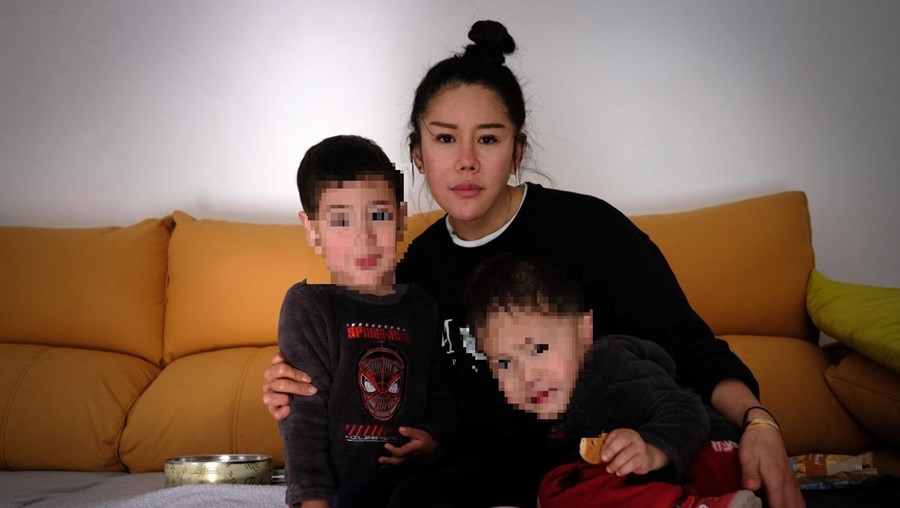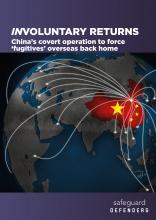Portugal set to extradite yet more people to China
Portugal, one of ten EU member states which continues to maintain an extradition treaty with Beijing, is about to extradite a woman back to China after a remarkable decision by its Supreme Court earlier this spring.
The extradition is taking place despite the significant deterioration of the Chinese criminal justice system and four EU parliament resolutions (2020-2022) calling for the suspension of such treaties (all of which passed with very significant majorities).
This article contains major updates, including full verdicts, analysis of verdicts, Supreme Court arguments, and more.
Latest update: Portugal's Constitutional Court, the final venue for appeal within Portugal, on 3 May upheld prior decisions, including by the Supreme Court, to extradite Zhang Haiyan to China. This despite the appeal centering on how prior decisions has, consistently, failed to take into account the legally binding European Convention on Human RIghts (ECHR), and failed to consider the issue of torture and the right to a fair trial (articles 3 and 6 respectively).
Against ECHR: A risky move by the Portuguese court
The story, largely unknown like many extradition cases – is, as far as initial research shows, only the third extradition from Portugal to China, and the first since a string of European countries’ courts started denying extraditions to China (2019-2021). Portugal ratified its extradition treaty with China in 2009.
Over the last several years, local courts, appeals courts, and even two Supreme Courts across Europe have refused Chinese extradition requests. The Supreme Court of Portugal on 24 February (verdict here) upheld an earlier ruling on 19 January (available here) by the Court of Appeal in Portugal's central city of Coimbra to extradite a 43-year-old Chinese woman named Zhang Haiyan back to China, in direct contravention of prior decisions by courts around Europe, and making a mockery of Portuguese commitments to the legally binding European Convention on Human Rights (ECHR).

Photo credit: Correio de manha / cmjornal.pt, used under Fair Use Doctrine
The case
Zhang, along with her husband, now 55, a 15-year-old teenage son, and two three-year-old twins, came to Portugal in 2018. After first living in Porto, they settled in the small city of Viseu in central Portugal.
Zhang is accused of engaging in fraudulent fundraising while he was living in Shanghai between October 2013 and August 2018 (article 192 of China's Criminal Law). He was said to have enticed investors with promises of higher than average returns. Zhang, however, is adamant that she was merely an employee, assured by her superiors that seeking investments under such terms was acceptable. "I'm not a bad woman and I didn't take the money. I didn't do anything, I was just an employee" Zhang said to Portuguese newspaper Correio de manha.
Portuguese police detained Zhang whlie she was living in Viseu on a Chinese arrest warrant on 19 April 2021, which we can conclude could only have happened if China issued a Red Notice or Diffusion via INTERPOL. After two Note Verbale (which contains diplomatic assurances) were delivered by China, on 16 and 22 of June 2021, the request for her extradition was filed on 4 August 2021, sparking the judicial review began.
Unlawful promises by China uncontested, ECHR rules ignored
As her crime carries a possible sentence of life imprisonment, and Portugal does not have such a sentence, the court approved her extradition based on the diplomatic assurances delivered 16 and 22 June 2021 that promised she would not be given such a sentence if extradited back to China. However, there is no information yet if that diplomatic assurance was issued by the Chinese Supreme Court. The note verbale (which conveyed the assurances) states that the Supreme Court had indeed said so, however, if a copy of such a decision was actually included is unclear. In 2019 in Sweden, when the Swedish prosecutor's office asked for a copy of the Supreme Court's actual decision in another extradition case, they were refused. Chances are - but we do not know yet - that no such decision has actually been provided to Portugal.
If the Supreme Court decision was provided it would have been incredibly rare. In all instances of Chinese diplomatic assurances known to Safeguard Defenders in the past, no Supreme Court decision has been provided, just a note saying that the decision has been made. In fact, the note verbale as quoted in the appeal court's decision merely states:
... the People's Republic of China and the decision of the Supreme People's Court of the People's Republic of China, in the case of the extradition of ZH from Portugal to China, if ZH is convicted by a Chinese court for the facts underlying the extradition request, the trial court will not impose a sentence above life imprisonment (including life imprisonment) in accordance with the law.
This makes no mention of any actual decision from the Supreme People's Court at all. In fact, the appeal court's verdict states outright that it's not Portugal's responsibility to check whether such a decision has been taken, as long as the Chinese Foreign Ministry states that it has. It goes so far as to state "In short, the sincerity of diplomatic commitment is assumed". - This is astounding logic since it describes China, a country with a long history of violating diplomatic assurances as well as legally binding treaties and laws. To add insult to injury, one of the notes carrying the diplomatic assurances was apparently not even dated (nor signed), yet the court states in its verdict that it sees no problem with that.
According to China's own Extradition Law (2000), only the Supreme Court - no other agency - has the power to issue promises related to sentencing. For details on this, see Safeguard Defenders' report Hide and Seek, on China’s extradition issues. Other agencies may deliver such decisions, but it seems here no decision has even been delivered, only a confirmation that a decision has been taken.
Up until now, many courts across Europe have denied China's assurances simply because China's Supreme Court did not issue them. Rather, assurances are often issued by China's Ministry of Foreign Affairs, which has no legal authority to do so under Chinese law, rendering them meaningless back in China.
 Take the case of Wang Jianye, who was extradited back to China under the promise (from the Chinese prosecutor) that he would not be executed. He was executed shortly after his extradition. This also happened with Yang Fong, sent back from Canada. Only the Supreme Court has legal standing to issue assurances related to sentencing or imprisonment (and for anything relating to prosecution itself, only the Supreme Procuratorate).
Take the case of Wang Jianye, who was extradited back to China under the promise (from the Chinese prosecutor) that he would not be executed. He was executed shortly after his extradition. This also happened with Yang Fong, sent back from Canada. Only the Supreme Court has legal standing to issue assurances related to sentencing or imprisonment (and for anything relating to prosecution itself, only the Supreme Procuratorate).
Another crucial point that the UN has repeatedly emphasized is that diplomatic assurances do not relieve the state of its legal responsibilities such as non-refoulment ( that is "no one should be returned to a country where they would face torture, cruel, inhuman or degrading treatment or punishment and other irreparable harm").
The appeal's court makes no reference, whatsoever, to any statutes of the ECHR, nor to the issues of torture, maltreatment, flaws in the Chinese criminal justice system, political control of the courts, nor to the issue of fair trials. At all. In fact, in the Supreme Court's judgment, the ECHR is brought up in relation to the right to family life (article 8), and again, nothing related to article 3 (torture and maltreatment) nor article 6 (the right to a fair trial), nor to any international legal obligations beyond the ECHR that Portugal is bound by. In fact, the issue of torture and right to fair trial is only mentioned when assessing the validity of the diplomatic assurances and at no other point whatsoever.
Seemingly, Portugal has simply abandoned its obligations to these legally-binding commitments. It also implies that Portugal did not receive a decision from China's Supreme Court and that the word of the Chinese Foreign Ministry is enough of a guarantee for Zhang's treatment if she was sent back to China.
Portugal's Supreme Court verdict includes the almost comical line, delivered by the prosecutor, that "It should also be noted that the appellant's extradition is not being authorized for the purpose of serving a prison sentence, but only for criminal proceedings, it is not known whether, in the end, she will be sentenced to an effective prison sentence, having necessarily to admit that she may even be acquitted".
This shows an abject lack of understanding of the Chinese criminal justice system -- close to 100% of all trials end in a conviction (see below). This is immediately followed by the prosecutor raising the hypothetical danger of Portugal becoming a safe haven for vast amounts of Chinese criminals if extradition was refused in this case.
Recent decisions by the Swedish Supreme Court, the Czech Constitutional (Supreme) Court, and the Polish Appeal's Court have quashed extraditions based on the conviction rate, but also because the European Convention on Human Rights (ECHR), which prohibits any extradition, no matter what, if there is a significant risk of torture or maltreatment (article 3) and the deprivation of a fair trial (article 6). A new report by Safeguard Defenders out soon will show that conviction rate in China’s criminal trials in 2021 reached a new record high since 1980 (the first year for which there is data), with 99.97% of all sentences leading to guilty verdicts.
Zhang's last chances lies in the possibilities of being filed to the Constitutional Court or the European Court on Human Rights.
A failure to properly assess the validity and trustworthiness of the diplomatic assurances offered (including if they are even legally valid), let alone to take into account legally binding commitments under the ECHR, risks putting Portugal at odds with the EU, and have the case pushed to the European Court on Human Rights, as well as the United Nations Committee Against Torture, which recently took steps to intervene against the Moroccan government’s ill-considered decision to approve an extradition of a Chinese national.
Portugal’s prior stance on extraditions to China
Portugal’s first known extradition case related to China was in 2014, when China sought the return of 42 year-old Wang Xiaodong, a man already convicted to ten years. Portugal refused, as there was no equivalent crime in Portugal for the crime he had been convicted for. The case is known because China had listed him as wanted on INTERPOL’s most wanted.
Since then, there have been no further public information on extraditions to China, as Portuguese media, unfortunately, does little to cover China-related developments. However, Safeguard Defenders have, via official documents provided by the Chinese government to another European government, as support for their attempt at an extradition in that country, identified two other Chinese citizens who were indeed extradited from Portugal to China.They are Han Wei, a woman whose extradition took place on 3 March 2018, and Cai Bin, a man sent back on 10 May 2018. Both were accused of illegal absorption of public funds (article 176 of the Chinese Criminal Law).

Attempts to track down any additional information on both these individuals have failed. Neither appears in China’s Supreme Court-run database China Judgment Online. Only those s accused of national security crimes do not have their verdicts in the database.
Safeguard Defenders' campaign against transnational repression
 Safeguard Defenders is working to locate her legal counsel, as many local lawyers across Europe are unaware of the legal validity and regulations in Chinese law governing diplomatic assurances and to a lesser extent, how such extraditions are almost guaranteed to violate articles 3 and 6 of the European Convention on Human Rights (ECHR).
Safeguard Defenders is working to locate her legal counsel, as many local lawyers across Europe are unaware of the legal validity and regulations in Chinese law governing diplomatic assurances and to a lesser extent, how such extraditions are almost guaranteed to violate articles 3 and 6 of the European Convention on Human Rights (ECHR).
It is unknown whether the Chinese government has engaged in any acts of transnational repression against Zhang, her family here in Portugal, or against any family remaining in China (her two parents, and her husband's father), as they have been doing for targets living in Cyprus, in an eerily similar case, and which was recently exposed by Safeguard Defenders, and reported on in the Washington Post.
For Portugal, this case and its court(s) seem oblivious to the issue at hand, and this adds further risks. Not long ago, the United Kingdom warned a number of UK citizens, including a member of its Parliament, of the danger posed by traveling to Portugal and other countries that maintain extradition treaties with China. The seeming blatant failure of both the local and appeal's courts to take legal obligations into consideration when considering this extradition request from China - a country that refers to itself as a dictatorship in its very own criminal law - would indicate they have a good reason for it.
For more on extraditions and China, see Safeguard Defenders factsheet here.